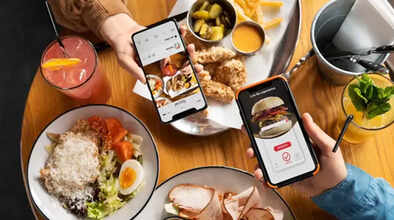Ordering food from Swiggy-Zomato will become more expensive, know how much the GST reform will affect your pocket..

After the change in GST rates, the doors of earning have opened for many sectors, from TV-fridges to small cars, which are going to be cheaper... But if you are fond of eating and drinking, and you order all this online, then your pocket is going to be affected a bit. Let's understand what effect the reform in GST will have on online food delivery apps and how it can prove to be expensive for you.
It will affect people's pockets.
Some time ago, food delivery apps increased their platform fees, which affected the pockets of those who order food on these apps daily. Meanwhile, now people can get another shock: the government will now collect GST from food delivery apps, and if the companies put this burden on the people, then the food coming home can become a little more expensive.
In fact, local e-commerce delivery services have been brought under Section 9(5) of the CGST Act by the Goods and Services Tax (GST) Council. This section deals with levying tax on the supply of services. The electronic commerce operator (ECO) will pay this output tax, which means that now 18% GST will be levied on the delivery fee.
What was the rule earlier?
Till now, food delivery apps like Zomato and Swiggy did not have to pay GST on delivery fees; it was considered to be passed through to the delivery partner. That is, the company did not consider it as part of its earnings, but now this will not happen. Whether the company considers it as part of its earnings or not, it will have to pay 18 percent tax on it.
How much will the delivery charge increase?
According to investment firm Morgan Stanley, in the financial year 2025, the customer delivery charge in Zomato's food delivery service was ₹ 11-12, which can now increase by ₹ 2 per order. At the same time, the delivery charge for Swiggy is around ₹ 14.5 per order, which can increase by ₹ 2.6 per order.
What about companies like Blinkit and Zepto?
Apart from food delivery apps, there is also a quick-commerce segment in the market. Which includes apps like Blinkit, Instamart, and Zepto. Blinkit considers delivery fees as a part of its earnings, so GST is already levied on it, meaning it will not be affected. On the other hand, the delivery charge on other apps is either free or up to two or four rupees; now an extra charge of less than one rupee can be levied on it.
Overall, this decision is going to affect food delivery apps. If the company pays this charge itself, it will suffer financial loss, while if its burden is put on the customers, then there may be a decrease in orders. The company will suffer loss from both sides.
Disclaimer: This content has been sourced and edited from NDTV India. While we have made modifications for clarity and presentation, the original content belongs to its respective authors and website. We do not claim ownership of the content.

